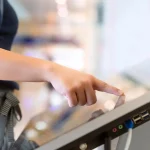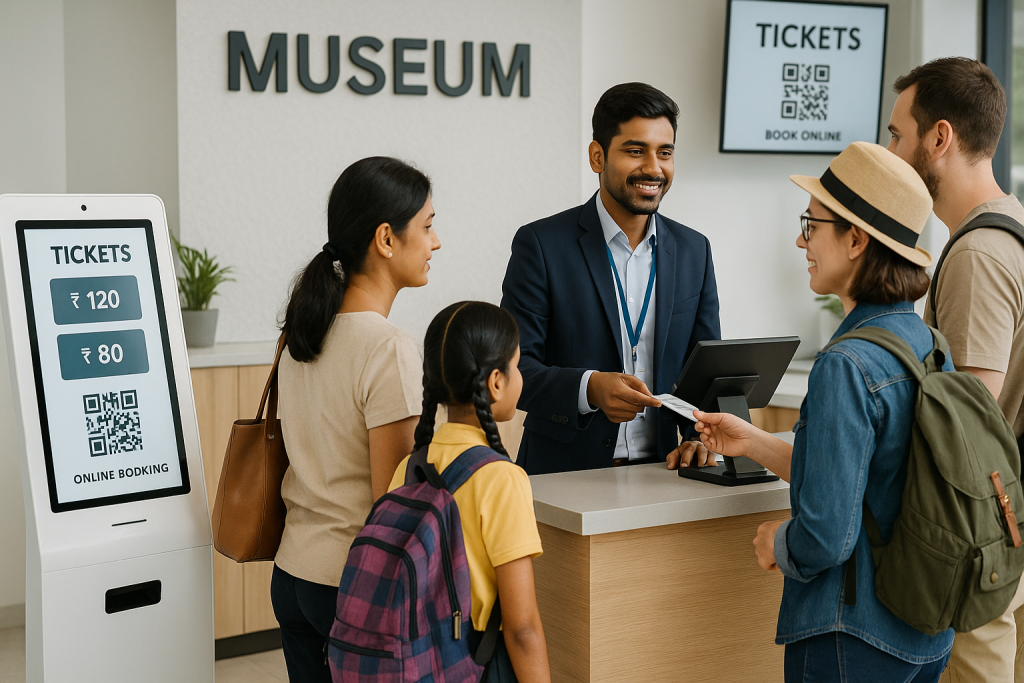In today’s experience-driven world, museum ticketing systems are no longer just about managing entry—they are about creating memorable journeys for every visitor. Yet many museums still struggle with effectively managing visitor flow, ticket sales, and engagement. Outdated ticketing systems often lead to long queues, lost sales opportunities, and fragmented visitor experiences.
Traditional ticketing methods, while once sufficient, are now painfully slow and disconnected from the broader needs of modern museums. Staff spend excessive time on manual tasks, marketing teams lack visitor insights, and leadership misses critical data to make informed decisions.
That’s where CRM integration comes in. By connecting Customer Relationship Management (CRM) tools with museum ticketing systems, museums can streamline operations, personalize visitor interactions, and build long-term relationships that go far beyond the ticket booth. Let’s explore how modern CRM solutions are reshaping the future of museum ticketing.
Understanding Museum Ticketing Systems Today
Museum ticketing has evolved significantly over the last decade. What was once a simple process of issuing physical tickets at the entrance has now transformed into a multi-channel, dynamic experience.
Today’s museum ticketing systems offer:
- Online and mobile ticket sales: Visitors expect the convenience of buying tickets from their devices, anytime.
- Timed-entry management: Controlling visitor flow to avoid overcrowding and enhance the experience.
- Group and membership management: Handling bulk bookings, school groups, and loyal members efficiently.
- Data and analytics: Tracking visitor numbers, peak times, and revenue generation.
However, while modern ticketing platforms have expanded features, many systems still operate in silos — disconnected from marketing tools, visitor feedback, or donation management systems. This lack of integration leads to missed opportunities to understand and engage with visitors more deeply.
Importance of Digital Museum Ticketing Solutions
Digital ticketing solutions are no longer a luxury; they are a necessity.
They enable:
- Faster and contactless entry: Especially critical in a post-pandemic world.
- Enhanced visitor experience: Easy booking processes and personalized communication.
- Operational efficiency: Reducing manual paperwork and freeing up staff for more meaningful tasks.
- Data-driven decisions: Access to real-time data on visitor behaviors and preferences.
Yet, ticketing alone isn’t enough. To truly unlock the power of digital transformation, museums must bridge the gap between ticket sales and visitor engagement, and that’s where CRM integration becomes a game-changer.
Why CRM Integration Matters for Museums
Incorporating a CRM into your museum’s operations isn’t just a tech upgrade — it’s a strategic move towards building stronger, more personalized visitor relationships.
CRM Benefits for Museum Ticketing
When museums integrate CRM systems with ticketing platforms, they unlock a wide range of benefits:
- Unified Visitor Profiles: Every ticket purchase, membership signup, or event registration feeds into a single visitor profile, helping museums understand preferences and behaviors.
- Targeted Marketing Campaigns: With detailed visitor insights, museums can launch personalized email campaigns, promote relevant exhibitions, and boost repeat visits.
- Streamlined Operations: Automation of communications like ticket confirmations, event reminders, and donation solicitations saves time and ensures consistency.
- Increased Revenue Opportunities: By analyzing visitor data, museums can identify upsell opportunities, such as premium tours, memberships, or merchandise.
- Improved Visitor Loyalty: Personalized engagement builds emotional connections, turning first-time visitors into long-term supporters.
Customer Relationship Management for Museums Explained
Customer Relationship Management (CRM) for museums is not just about tracking transactions — it’s about understanding and nurturing every stage of the visitor journey.
A strong museum CRM solution typically helps with:
- Visitor segmentation: Grouping visitors based on demographics, interests, and past behaviors.
- Event and membership management: Organizing events, tracking attendance, and managing renewals seamlessly.
- Donation and fundraising efforts: Targeting donors effectively based on past contributions and engagement history.
- Feedback and surveys: Collecting and analyzing visitor feedback to continually improve experiences.
By integrating CRM with museum ticketing systems, museums create a 360-degree view of their audience. This comprehensive insight allows them to craft personalized experiences that delight visitors and drive long-term growth.
How CRM Enhances the Ticketing Workflow
Efficient ticketing operations are the backbone of a smooth visitor experience. A well-integrated CRM doesn’t just assist museum teams — it transforms the entire ticketing workflow into a streamlined, intelligent system.
Streamlining Museum Ticket Sales
Without CRM integration, ticket sales often require manual data entry, paper-based tracking, and fragmented systems for online and in-person sales.
With CRM integration for museums, ticket sales become:
- Centralized: Whether a visitor buys online, via phone, or at the counter, all transactions are recorded in one place.
- Faster: Staff can quickly access visitor histories, memberships, and discounts without toggling between multiple systems.
- More Personalized: Returning visitors can be greeted by name, offered relevant event suggestions, or even receive loyalty perks automatically.
A centralized system not only improves the staff’s workflow but also creates a seamless, delightful experience for the visitor.
Automating Museum Ticketing with CRM
Automation is one of the biggest advantages of modern museum CRM solutions.
CRM-driven ticketing systems can:
- Send instant confirmations and mobile tickets after purchase.
- Automate event reminders and pre-visit communications.
- Trigger post-visit surveys for feedback collection.
- Schedule renewal notices for memberships without manual tracking.
By automating these essential touchpoints, museums free up staff time, reduce human error, and ensure no visitor falls through the cracks.
Optimizing the Museum Ticketing Process for Efficiency
Integrating CRM with museum tickets doesn’t just make processes faster — it makes them smarter.
CRM systems can provide real-time reporting dashboards showing:
- Visitor flow patterns (helping schedule staff or special events)
- Peak sales periods (informing marketing pushes)
- Conversion rates from promotional campaigns
These insights allow museums to continuously optimize their operations, leading to higher visitor satisfaction and increased revenue.
Key Features of Modern Museum CRM Solutions
Choosing the right CRM technology is crucial for museums aiming to advance their ticketing systems. A modern museum CRM should offer specific features that align with the unique needs of cultural institutions.
Museum Visitor Management CRM Features
Effective visitor management is about more than just counting heads.
Leading museum CRM solutions offer:
- Comprehensive visitor profiles: Tracking past visits, preferences, and engagement activities.
- Segmented communications: Sending targeted messages based on visitor interests (e.g., art, science, history lovers).
- Loyalty and rewards programs: Encouraging repeat visits through tailored incentives.
- Flexible group booking management: Handling school groups, corporate events, or special tours with ease.
Museum CRM Technology Must-Haves
Not every CRM system is built for museums.
When considering CRM and museum ticketing integration, key technology must-haves include:
- Cloud-based access: Ensuring flexibility and remote work capabilities.
- Mobile compatibility: Allowing ticket scanning, visitor check-ins, and sales from tablets or smartphones.
- Data privacy compliance: Protecting visitor information under GDPR and other regulations.
- Open APIs: Facilitating easy museum ticketing software integration with existing platforms.
Choosing CRM software tailored for museum environments ensures that technology serves both staff and visitors efficiently.
Integrated Museum Ticketing Platforms Overview
An integrated museum ticketing platform combines ticket sales, CRM data, event management, and reporting under one ecosystem.
The result? A seamless experience where:
- Visitors move from browsing an exhibition online to booking tickets effortlessly.
- Staff can access complete visitor information instantly.
- Marketing campaigns are launched with precision targeting, based on real-time data.
Integrated museum ticketing platforms eliminate data silos and empower museums to engage smarter and sell better.
CRM and Museum Ticketing: Real-World Use Cases
Theory is important, but seeing CRM technology in action brings its real value to life. Here’s how museums are already leveraging CRM integrations to transform their operations.
Museum Admissions CRM Integration Examples
- Timed Entry Optimization: One museum implemented CRM-driven timed ticketing, balancing visitor flow across peak hours and improving the on-site experience.
- Membership Upselling: Another museum used CRM data to identify frequent visitors and automatically offer discounted memberships at checkout, increasing membership conversions by 20%.
- Event Personalization: Through CRM insights, a science museum was able to send targeted invites for special exhibitions based on visitor interests, driving record event attendance.
These examples showcase how CRM and museum ticketing integration can be tailored to fit an institution’s unique goals and audience.
Enhanced Museum Ticketing Operations with CRM Systems
- Automated Communications: Museums using CRM-enhanced systems send automated pre-visit instructions, cutting down on visitor confusion and last-minute questions.
- Donation Campaign Success: Integrated systems allow ticket purchasers to be seamlessly prompted for small donations during checkout, raising significant additional funds annually.
- Data-Driven Exhibits: By analyzing visitor data, museums can design exhibits that better match audience preferences, leading to longer visits and more ticket sales.
When museums integrate CRM with ticketing, they move beyond transactions — they cultivate relationships that keep visitors coming back year after year.
How to Successfully Integrate CRM with Museum Tickets
Integrating a CRM system into a museum’s ticketing workflow is a transformative move, but it requires strategic planning and careful execution to realize its full benefits.
Museum Ticketing Software Integration Process
The ideal integration process typically follows these steps:
- Assessment: Evaluate current ticketing and visitor management systems. Identify pain points and opportunities for improvement.
- Requirement Gathering: Define what features the museum needs — mobile ticketing, membership management, data reporting, etc.
- Vendor Selection: Choose a CRM and ticketing platform that offers strong integration capabilities and is designed for cultural institutions.
- Pilot Testing: Start with a small-scale rollout to test functionality, train staff, and gather feedback.
- Full Implementation: After successful testing, deploy the integrated system across all sales channels.
- Ongoing Optimization: Regularly update, maintain, and optimize the system based on visitor and staff feedback.
Museum CRM Implementation Best Practices
To ensure successful CRM integration for museums:
- Prioritize staff training: Equip teams with the knowledge they need to use the CRM and ticketing software effectively.
- Focus on visitor experience: Always consider how each feature enhances the visitor’s journey.
- Plan for data migration: Ensure existing visitor and sales data is accurately and securely transferred into the new system.
- Set measurable goals: Define KPIs such as reduced ticketing time, higher membership sales, or improved visitor satisfaction scores.
Avoiding Pitfalls in Museum CRM Software Solutions
Some common challenges can derail CRM projects. Here’s how to avoid them:
- Overcomplicating the system: Choose solutions that are intuitive and easy for staff to use daily.
- Ignoring customization: Museums have unique needs; avoid one-size-fits-all platforms that don’t cater to cultural institutions.
- Underestimating change management: Keep communication clear and staff engaged throughout the transition process.
- Neglecting data security: Always prioritize platforms that comply with data protection standards.
A thoughtful approach to CRM integration ensures museums not only streamline ticketing but future-proof their visitor engagement strategies.
The Future: Advancing Museum Ticketing Systems with CRM
As technology continues to evolve, the relationship between CRM systems and museum ticketing platforms will only deepen, offering museums exciting opportunities to redefine visitor engagement.
Trends in Museum Ticket Sales CRM
- Predictive Analytics: CRM systems will anticipate visitor behaviors, recommending exhibitions, membership upgrades, or donation opportunities based on past interactions.
- AI-Powered Communications: Chatbots and automated responses will guide visitors pre- and post-visit, enhancing engagement without overwhelming staff.
- Omnichannel Ticketing: Future-ready museums will offer a fully integrated experience across web, mobile apps, kiosks, and in-person sales.
- Deeper Personalization: From personalized ticket bundles to curated exhibition tours, CRMs will enable highly tailored visitor experiences.
Role of Museum CRM Software Solutions in Visitor Experience Innovation
Modern CRM and museum ticketing integrations will:
- Allow seamless cross-sell and up-sell opportunities during ticket purchases.
- Enable real-time visitor flow adjustments based on live data.
- Support dynamic pricing strategies for special exhibitions or peak times.
- Foster long-term visitor relationships through smart loyalty and membership programs.
Museums that embrace CRM technology aren’t just upgrading their ticketing — they’re building a visitor-centric future where each interaction feels personal, effortless, and memorable.
Conclusion
Traditional museum ticketing systems can no longer keep pace with visitor expectations. CRM integration is transforming museum ticketing systems — making them smarter, faster, and infinitely more visitor-friendly.
From streamlining sales and automating workflows to unlocking rich visitor insights, CRM technology empowers museums to deliver exceptional experiences while driving sustainable growth.
It’s clear: customer relationship management for museums is no longer optional — it’s essential.
If your museum is ready to enhance operations, engage visitors more meaningfully, and future-proof ticketing processes, EveryTicket can help.
Our digital museum ticketing solutions combine powerful CRM integration, effortless visitor management, and scalable technology, purpose-built for the needs of modern museums.
Discover how EveryTicket can transform your museum’s ticketing journey today. Book a free demo today with our team.



